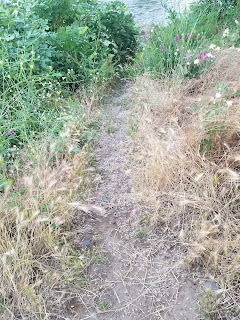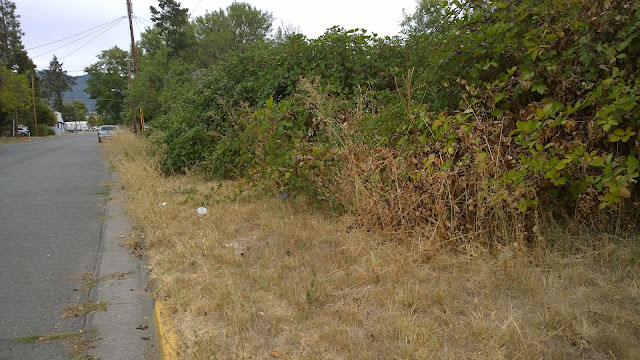We can fix our water and sewer rates!
Water should never be rationed by price. Every household
should be able to afford to water their yard, protecting their city from fire,
as it was before water-rationing rates. Every
household should pay the same charge for sewer within their water service size
class, as it was before water-rationing sewer rates.
·
No
unit rates on sewer; minimal unit rates on water.
·
All
water overhead paid through monthly base rates to pay monthly utility expenses.
·
Water
unit costs covered by a single unit price.
·
All
sewer costs equally shared through base rates, no extra charges.
·
Rates
to rise by inflation of actual utility costs, not the Consumer Price Index
(CPI).
·
No
franchise fees. The City cannot charge a
franchise fee for a business it owns.
We can do this by putting a city initiative on the ballot,
creating a Ratepayer Utility Rate Board for Grants Pass, passing it, and electing
its members after it passes.
·
Rates
will be set by an elected 5-member Ratepayer Utility Rate Board (Ratepayer
Board)
·
Ratepayer
Board eligibility is open to any registered voter living in a residence that
uses Grants Pass water and/or sewer and who does not work for the city in any
other capacity.
·
Each
member of the Ratepayer Board shall take an oath to stick to the above
financial principles in setting utility rates.
·
Each
meeting of the Ratepayer Board will begin with a statement of these principles.
·
The
Ratepayer Board will meet 5 business days within one week per year to set the
rates and shall be compensated $100 per day for their attendance.
·
The
City Manager shall provide each member of the Ratepayer Board with the previous
year’s expenses of the water and sewer systems, including the Ratepayer Board’s
per diem, one week before Ratepayer Board meetings begin.
Before we can do any of this, we need: a group to help write
the petition; people to circulate the petition for the ballot; and people
willing to serve on the Ratepayer Board.
All of this will be quicker and easier with money, so please donate.
We could use a website, too. All
of this must come together before we can even start to circulate a petition. Fortunately, we get 2 years after the
petition is approved to circulate to finish.
Let us know if you are interested in helping.
541-955-9040 rycke@gardener.com
&&&&&&&&&&&&&& 2nd page &&&&&&&&&&&&&&&
Rationing rates have relatively low base rates and high unit
rates, designed to cause less use of a product or service.
They give us cheap access to water and sewer service and make us pay
through the nose to use it. Worse yet, as
use keeps dropping, rates are hiked by more than inflation every year to cover
overhead in a very high-overhead business.
Overhead is the cost of the whole water or sewer system, bills that must
be paid monthly regardless of use: debt payments; salaries; maintenance budgets;
electricity for lights and computers.
Unit costs rise and fall with use of the utility, like water-cleaning
supplies and power for pumping. (Sewer
will have no unit price.)
Grants Pass has had water-rationing rates since the 1990s but
got serious about it in 2006 with much higher tiered unit rates and a lower
base rate. Water use dropped a lot. In 2008, City staff
told the Council that their conservation rates had worked so well that the
water plant could not pay the overhead.
Staff asked the council to raise the base rate by $3, which they said would
stabilize revenues. Council passed the base
rate raise but it didn’t stabilize revenues because the unit rates were too
high; the base rate was too low; so people kept cutting back on use. After that, Grants Pass raised base and unit
rates by the same percentage yearly to pay the overhead, until the City Council
dedicated $3 million in America Rescue Act money to the new water plant and cancelled
the last 2 yearly raises in rates for the new plant to compensate ratepayers. But they are still raising rates by the CPI
and will likely raise them to cover overhead every year.
The city started rationing rates on sewer in 2013, basing
sewer units on the average of each winter month’s water use.
Sewer unit rates are especially bad for ratepayers and the sewer system because
unit costs of cleaning sewage are much higher than for water. They are particularly hard on the poor who must
live many to a house and put a lot of water down the sewer. When people cut back on water use by reducing
what goes down their drains, they cut the water needed to make sewage flow
smoothly. Since sewage unit rates began,
we have had sewage pumps clogging. This
is why we didn’t charge for sewer units before, and Medford and Portland still
don’t.
When revenues don’t meet overhead expenses, maintenance is
the easiest expense to cut. Grants Pass never budgets what is
recommended for replacement of pipes. We
had rationing rates for at least 20 years before we were told that our
80-year-old water plant is falling apart and we need a new one. Electricity and natural gas utilities started
rationing utility rates in the ‘70s, which is why we have had forest fires and
gas leaks started by poor maintenance of power and gas lines.
Water-rationing rates have spread to cities around the world, making weather more variable and temperatures
more extreme worldwide, causing bigger fires closer to cities, sometimes
burning right through them, due to lower humidity from much less
irrigation. It’s time to start the
Great Ratepayers Revolt by taking control of our city utility rates.
Rycke Brown, Natural Gardener 541-955-9040 rycke@gardener.com
Join Ratepayers for Fair Water and Sewer
Pricing on Facebook








